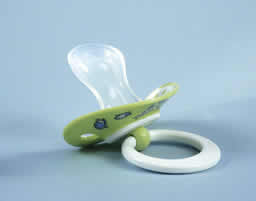milk teeth
milk teeth
Small mouth, small teeth
A child's small mouth cannot fit adult teeth. That is why a child first gets milk teeth. The teeth are important for biting, chewing, speaking and swallowing. The deciduous teeth influence the development of the face and jaws. In addition, it plays an important role in the development of permanent teeth.
When do children get their baby teeth and molars?
The age at which children get their teeth differs per child. Usually the first baby tooth erupts between 6 and 9 months. The first 2 milk teeth emerge at the bottom in the middle. This is followed by the 2 middle incisors at the top. The last milk molar usually appears between 24 and 30 months. A complete deciduous set consists of 12 teeth and 8 molars. Both the teeth of the deciduous teeth and those of the permanent teeth usually erupt in a certain order (see drawing).
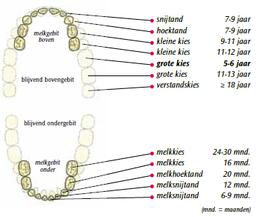
When do children get their permanent teeth?
A child changes his milk teeth between the age of 6e and 13e year. Permanent ones will replace the milk teeth and molars. Around 6e year of life, a new, permanent molar erupts behind the last milk molar. This usually happens before the front teeth change. The new molars are a bit hidden. Many children and parents do not notice that the first permanent molars erupt. Taking care of these molars is very important. The enamel of the newly erupted tooth is still very porous and fragile. Brush the tips of the new molars as soon as they come through. Around 12e years, permanent molars break through again. They are also extra sensitive to getting cavities just after breaking through. Wisdom teeth are the last molars to erupt. A complete set of permanent teeth consists of 12 teeth and 16 molars. Wisdom teeth are not included in this. They break through later in life. Some people don't get wisdom teeth.
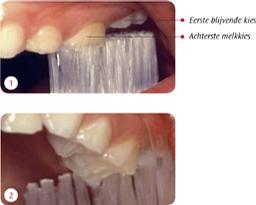
Are all children equally likely to have cavities?
Whether your child gets a cavity depends on how well his teeth are brushed and whether he eats a lot of sweets or drinks. With little sugar consumption and careful brushing of your teeth, every set of teeth can remain intact.
Do you have to take good care of milk teeth?
A child automatically exchanges its milk teeth for permanent teeth. You might think that it is therefore not necessary to take good care of milk teeth. Nothing is less true. Poor care can cause cavities and gum disease. This can hurt, so that your child eats worse, does not feel well or sleeps less well. Poor care of the milk teeth can also affect the permanent teeth. This happens, for example, if milk teeth or molars are lost prematurely. Then there is often too little space for the permanent teeth.
How can I properly brush my child's teeth?
To prevent tooth decay and inflamed gums in your child, it is important that you brush your child's teeth properly. Consider the following:
- Brush the teeth once a day as soon as the first tooth has erupted with fluoride toddler toothpaste.
- Use a toddler toothbrush with soft bristles. The small brush easily reaches all teeth. Don't press too hard.
- For children up to 2 years old, brushing the teeth once a day is sufficient. Brush the teeth of children from 2 years 2x a day.
- Brush in a fixed order according to the 3 B's: Binside, Bout side, Boven side. Always brush the edge of the gums. You can easily and efficiently clean children's teeth using the scrubbing method. Make short horizontal overlapping movements. You can also use a children's electric toothbrush.
- Introduce your child to brushing teeth in a playful way. Make it a daily recognizable ritual. Think of the beginning as an acclimatization phase. During that period, applying fluoride with the toothpaste is more important than getting everywhere with the brush.
- Brush the tips of the new teeth that erupt immediately. This applies to both the milk teeth and the permanent teeth. The enamel of newly erupted teeth and molars is not yet strong. They are therefore extra sensitive to getting cavities.
- The first permanent molar erupts behind the last milk molar. Because it is lower, it is difficult to see. Also brush this new molar well. Place the brush there across the row of teeth. Encourage children from the age of 2 to brush their own teeth. That makes it a habit. Do brush your teeth daily, because your son or daughter can't do it well enough yet. Keep brushing your child until they are 10 years old. Make sure you have a good view in the mouth and that there is sufficient support for your child's head when you brush (after). Try out which brushing position is most comfortable for you. For example, stand diagonally behind your child. If you support the chin with your hand, the head rests against your upper body. Bend over your child a little so you can see where you are brushing. Or stand in front of your child and let him rest his head against the wall, for example. Support the chin with one hand while you brush with the other. This way you can clearly see where you are brushing.
- Take your child to the dentist or dental hygienist when the first tooth erupts. Then it has enough time to get used to the environment and the people who work there.

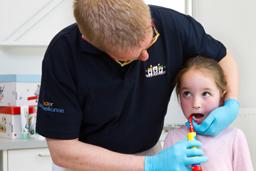
Fluoride
Fluoride is a natural substance that makes the teeth less vulnerable to acid attacks by bacteria. Using the right amounts of fluoride helps prevent cavities in teeth. The amount of fluoride in fluoride toddler toothpaste is age appropriate. Toothpaste for adults contains more fluoride. Switch to this when your child turns 5 years old. Or use toothpaste marked 'children' or 'junior' for children aged 5 and over. Always look at the age indicated here (for example 5-12 years).
What is the influence of food and drink on milk teeth?
Almost all our food and drinks contain sugars and starch. They can be harmful to the teeth. This is especially true for sticky products. Bacteria convert sugars in the mouth into acids. Those acids affect the teeth. Fortunately, saliva has a protective effect. It neutralizes the acid effect on the teeth. But that takes time. Therefore, limit your child's eating and drinking times to a maximum of 7 per day. That is 3x a meal and a maximum of 4x a day a snack. Rather give your child savory than sweet things. Don't try to get your son or daughter used to sweets and don't add sugar to food and drinks. Choose tap water instead of sugary drinks. Light soft drinks do not cause cavities, but remember that they, like the sugary varieties, can still be acidic. Acidic products can also cause damage to the teeth when used frequently. We call this damage dental erosion.
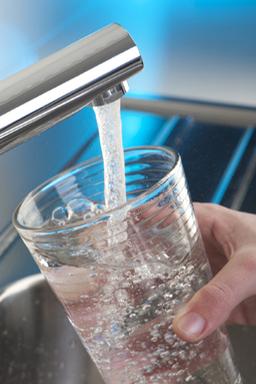
Rather a cup than a bottle
From 9 months, use a cup without a spout instead of a baby bottle or anti-drip cup. If necessary, use a spout cup first as an intermediate step. In the evening and at night, drinking from a baby bottle with sweet content or milk is particularly harmful. At night there is less saliva to protect your teeth. You can always take a bottle of water to bed with you. Frequent sucking on a baby bottle or anti-drip cup with, for example, fruit juice, syrup, drinking yoghurt or other dairy products can affect the teeth. The teeth come into contact with sugars for a long time. This gives (baby bottle) caries more chance. Let your child drink their sweet drinks in one go. Choose tap water more often instead of sweet drinks.
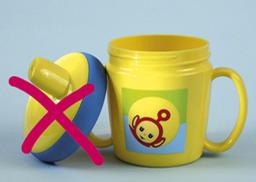
Better a pacifier than a thumb
Sucking is a baby's natural, instinctive need. Children like to suck on their thumb or on a pacifier. Usually this does not cause any problems for the deciduous teeth. If the permanent incisors erupt, the sucking can push the upper teeth and jaw forward. Does your baby thumb? Rather give a dental teat. A child puts his thumb in his mouth faster and more often. You can easily remove a pacifier. That is also why it is usually easier to unlearn teat sucking. In any case, learn to stop sucking your thumb or teat as early as possible, but in any case before breaking through the permanent teeth.
